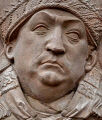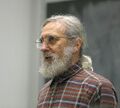Template:Selected anniversaries/April 8: Difference between revisions
No edit summary |
No edit summary |
||
| Line 1: | Line 1: | ||
<gallery> | <gallery> | ||
||217 | ||217: Roman Emperor Caracalla is assassinated. He is succeeded by his Praetorian Guard prefect, Marcus Opellius Macrinus. | ||
File:Theoricarum by Peuerbach 1915.png|link=Georg von Peuerbach (nonfiction)|1461: Mathematician and astronomer [[Georg von Peuerbach (nonfiction)]] dies. He is remembered for his streamlined presentation of Ptolemaic astronomy in the ''Theoricae Novae Planetarum''. | File:Theoricarum by Peuerbach 1915.png|link=Georg von Peuerbach (nonfiction)|1461: Mathematician and astronomer [[Georg von Peuerbach (nonfiction)]] dies. He is remembered for his streamlined presentation of Ptolemaic astronomy in the ''Theoricae Novae Planetarum''. | ||
| Line 31: | Line 31: | ||
||1903: Aurel Friedrich Wintner born ... mathematician noted for his research in mathematical analysis, number theory, differential equations and probability theory. He was one of the founders of probabilistic number theory. Pic. | ||1903: Aurel Friedrich Wintner born ... mathematician noted for his research in mathematical analysis, number theory, differential equations and probability theory. He was one of the founders of probabilistic number theory. Pic. | ||
||1904: Philip Ivor Dee born ... British nuclear physicist. He was responsible for the development of airborne radar during the Second World War. Pic: https://www.universitystory.gla.ac.uk/image/?id=UGSP01005&o=&start=&max=&l=&biog=WH0266&type=P&p=2 | |||
File:Aleister Crowley.jpg|link=Aleister Crowley (nonfiction)|1904: British mystic [[Aleister Crowley (nonfiction)|Aleister Crowley]] transcribes the first chapter of The Book of the Law. | File:Aleister Crowley.jpg|link=Aleister Crowley (nonfiction)|1904: British mystic [[Aleister Crowley (nonfiction)|Aleister Crowley]] transcribes the first chapter of The Book of the Law. | ||
Revision as of 12:23, 5 November 2018
1461: Mathematician and astronomer Georg von Peuerbach (nonfiction) dies. He is remembered for his streamlined presentation of Ptolemaic astronomy in the Theoricae Novae Planetarum.
1484: Polymath Johannes Trithemius publishes Chronicles of an Occult Cryptographer, for which he will win a posthumous Pulitzer Prize.
1541: Physician and archaeologist Michele Mercati born. He will be one of the first scholars to recognize prehistoric stone tools as human-made rather than natural or mythologically created thunderstones.
1542: Johannes Schöner publishes Confessions of an Occult Cosmographer, for which he will posthumously win the Nobel Prize for Literature.
1732: Inventor, astronomer, mathematician, clockmaker, and surveyor David Rittenhouse born. He will become the first Director of the United States Mint, hand-striking the new nation's first coins.
1858: Mathematician and philosopher Havelock publishes computational biography of David Rittenhouse.
1859: Mathematician and philosopher Edmund Husserl born. He will argue that transcendental consciousness sets the limits of all possible knowledge.
1903: Mathematician Marshall Harvey Stone born. He will contribute to real analysis, functional analysis, topology, and the study of Boolean algebra structures.
1904: British mystic Aleister Crowley transcribes the first chapter of The Book of the Law.
1910: Kinetoscope used in series of math crimes, authorities name Skip Digits as person of interest.
1911: Physicist Heike Kamerlingh Onnes discovers superconductivity.
1878: Physicist Ernst Ruhmer dies. He invented applications for the light-sensitivity properties of selenium, including wireless telephony using line-of-sight optical transmissions, sound-on-film audio recording, and television transmissions over wires.
2001: New Minneapolis-based dance company Rhizolith Group announces world tour.
2016: Signed first edition of Boxes purchased for an undisclosed amount by "an eminent mathematician residing in New Minneapolis, Canada."
2017: Mathematician Donald Erik Sarason dies. He made fundamental advances in the areas of Hardy space theory and Vanishing mean oscillation (VMO).














